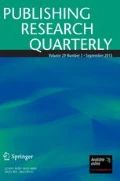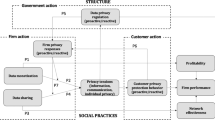Abstract
Classical contract theory—of will and morality, of promise or consent—translates awkwardly to contemporary publishing agreements where cultural products are not definitively valued, and publishing agreements’ industrial and aspirational ideals require an ongoing conversation, and relationship, between an author and publisher. Relational contract theory presents a framework in which parties to a contract can continue negotiations, particularly when industry developments create change or conflict. This paper applies relational contract theory to publishing contract negotiations to show how they operate incrementally, and illustrates via select qualitative interviews how contract terms are used in a post negotiation space to strengthen author–publisher relationships and support authors’ livelihoods.
Similar content being viewed by others
Notes
John Locke claimed that ‘Though the Earth, and all inferior Creatures be common to all Men, yet every Man has a Property in his own Person. This no body has any Right to but himself. The Labour of his Body, and the Work of his Hands, we may say, are properly his. Whatsoever then he removes out of the State that Nature hath provided, and left it in, he hath mixed his Labour with, and joined to it something that is his own, and thereby makes it his Property.’
References
Akerlof G. The market for lemons: qualitative uncertainty and the market mechanism. Q J Econ. 1970;84(3):488–501.
Alexander I. Copyright and the public interest in the Nineteenth Century. Oregon: Hart Publishing; 2010.
Barnett R. Contract is not promise; contract is consent. Georgetown: Georgetown University Law Center; 2011. p. 211–29.
Black O. Agreements: a philosophical and legal study. London: Cambridge University Press; 2012.
Bourdieu P. The rules of art. Cambridge: Polity Press; 1996.
Butler D, et al. Entertainment law. Annandale: Federation Press; 2017.
Carter D. In: Mannion A et al. (editors) The Return of Print. Monash University Publishing: Melbourne; 2016.
Deazley R. On the origin of the right to copy: charting the movement of copyright law in the Eighteenth Century (1695–1775). Oxford: Hart Publishing; 2004.
Freeman R. Writer-publisher relationships. In: Cope B, Freeman R, editors. Digital rights management and content development. Altona: Common Ground; 2001.
Fried C. Contract as promise. Oxford: Oxford University Press; 1981.
German Copyright Act
Glover s. ‘Getting on the Same Page’, Overland, Winter Edition (accessed September 2019) 2016.
Greco AN. The book publishing industry. 2nd ed. London: Routledge; 2005.
Hart HLA. The concept of law. 2nd ed. Oxford: Clarendon Press; 1994.
Kimel D. The choice of paradigm for theory of contract: reflections on the relational model. Oxford Journal of Legal Studies. 2007;27(2):233–55.
Leib EJ, Braucher J et al. Revisiting the contracts scholarship of stewart macaulay: on the empirical and the lyrical. London: Hart Publishing; 2013.
Macneil IR. ‘Relational Contract: What we do and do not know’ Wisconsin Law Review. 1985;4:483–526.
Matulionyte R. Empowering authors via fairer copyright contract law. UNSW Law J. 2019;42(2):150.
Mouzas S, Furmston M. From contract to umbrella agreement. California Law J. 2008;67:37–50.
Paterson JM, et al. Principles of contract law. 3rd ed. Rozelle: Thomson Reuters; 2009.
Remuneration of Authors Report
Ruddock A. Understanding audiences: theory and method. Sage; 2001.
Thompson JB. Merchants of culture. 2nd ed. Cambridge: Polity Press; 2012.
Throsby D, et al. Commerce or culture? Australian book industry policy in the Twenty-First century’. In: Mannion A, et al., editors. Publishing means business. Melbourne: Monash University Publishing; 2017.
Yuvaraj J, Giblin R. Are contracts enough? an empirical study of author rights in australian publishing agreements. Melbourne Univ Law Rev. 2020;44(1):1–30.
Author information
Authors and Affiliations
Corresponding author
Additional information
Publisher's Note
Springer Nature remains neutral with regard to jurisdictional claims in published maps and institutional affiliations.
Rights and permissions
About this article
Cite this article
Day, K. Publishing Agreements Through a Sharper Lens: How Relational Contract Theory Informs Author–Publisher Negotiations. Pub Res Q 37, 152–167 (2021). https://doi.org/10.1007/s12109-021-09806-9
Accepted:
Published:
Issue Date:
DOI: https://doi.org/10.1007/s12109-021-09806-9




